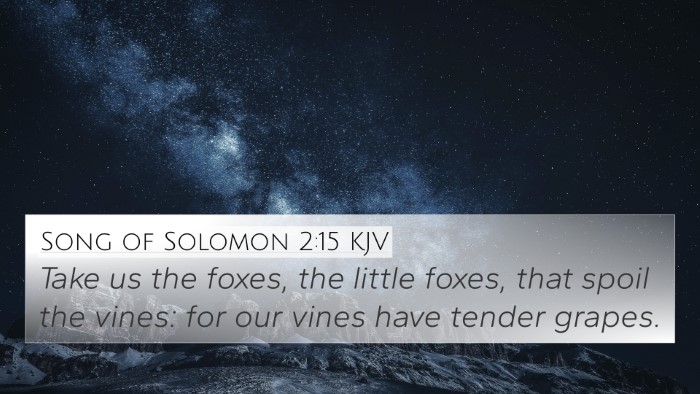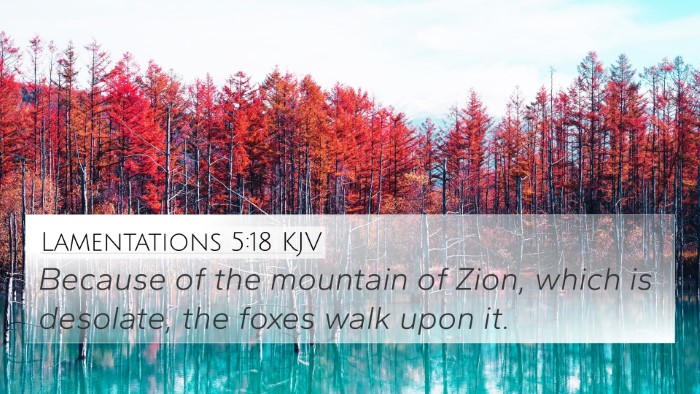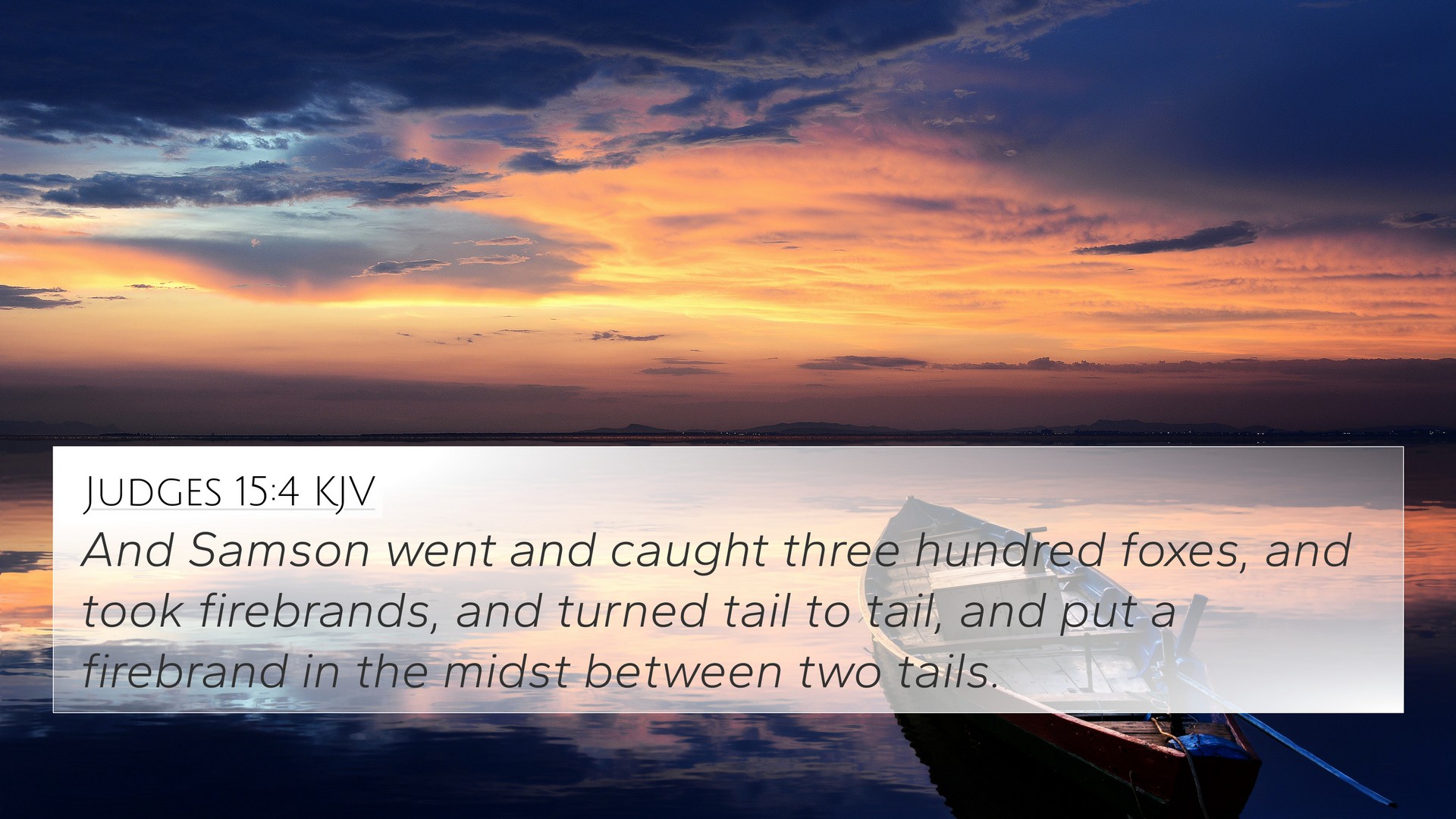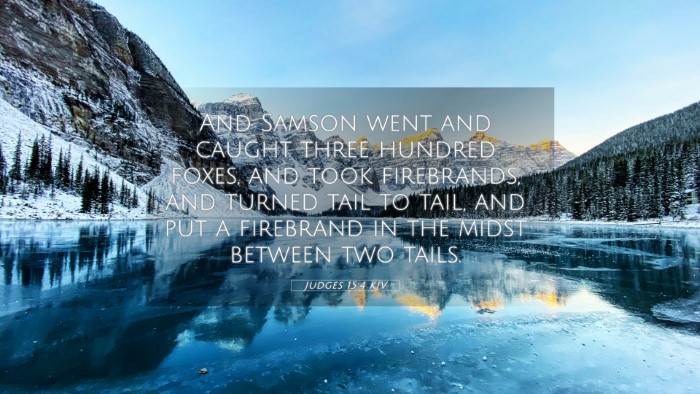Old Testament
Genesis Exodus Leviticus Numbers Deuteronomy Joshua Judges Ruth 1 Samuel 2 Samuel 1 Kings 2 Kings 1 Chronicles 2 Chronicles Ezra Nehemiah Esther Job Psalms Proverbs Ecclesiastes Song of Solomon Isaiah Jeremiah Lamentations Ezekiel Daniel Hosea Joel Amos Obadiah Jonah Micah Nahum Habakkuk Zephaniah Haggai Zechariah MalachiJudges 15:4 Similar Verses
Judges 15:4 Cross References
And Samson went and caught three hundred foxes, and took firebrands, and turned tail to tail, and put a firebrand in the midst between two tails.
Uncover the Rich Themes and Topics of This Bible Verse
Listed below are the Bible themes associated with Judges 15:4. We invite you to explore each theme to gain deeper insights into the Scriptures.
Judges 15:4 Cross Reference Verses
This section features a detailed cross-reference designed to enrich your understanding of the Scriptures. Below, you will find carefully selected verses that echo the themes and teachings related to Judges 15:4 KJV. Click on any image to explore detailed analyses of related Bible verses and uncover deeper theological insights.

Song of Solomon 2:15 (KJV) »
Take us the foxes, the little foxes, that spoil the vines: for our vines have tender grapes.

Lamentations 5:18 (KJV) »
Because of the mountain of Zion, which is desolate, the foxes walk upon it.
Judges 15:4 Verse Analysis and Similar Verses
Understanding Judges 15:4
Judges 15:4 states, "And Samson went and caught three hundred foxes, and took firebrands, and turned tail to tail, and put a firebrand in the midst between two tails." This action is a pivotal moment in the narrative of Samson, showcasing both his strength and his strategic thinking. Let's delve into the meaning of this verse by examining insights from public domain commentaries.
Context and Background
To fully grasp the significance of this verse, it is essential to consider the historical context. Samson was chosen by God to deliver Israel from the Philistines, who were oppressing them. His exploits often involved supernatural strength but also reflected deeper themes of vengeance and personal conflict.
Commentary Insights
- Matthew Henry: Henry emphasizes the uncommon nature of Samson's method, highlighting that it demonstrates his fierce defiance against the Philistines. The foxes symbolize his cleverness in using nature to execute divine judgment against his enemies.
- Albert Barnes: Barnes notes that this act of catching the foxes involved considerable skill. He points out that it illustrates Samson's resourcefulness and symbolizes the chaotic results of his actions, akin to spreading destruction and disarray among the Philistines.
- Adam Clarke: Clarke discusses the cultural significance of using foxes, which were commonly known to be destructive. He argues that Samson's choice of animals for burning the standing crops of the Philistines serves as a powerful metaphor for God’s judgment and the destructive nature of sin.
Thematic Connections
- Divine Retribution: Samson's act can be seen as an expression of God's judgment against the Philistines for their oppression of Israel.
- Resourcefulness in Adversity: This verse highlights the importance of using one’s wits in the face of overwhelming odds, a common theme in the stories of biblical heroes.
- Destruction of Evil: The burning of the crops symbolizes the destruction of evil, aligning with other biblical themes of purification and the need for justice.
Cross-References
This verse connects with several other Bible verses, enhancing its meaning and providing a broader understanding of Samson's role and actions. Here are key cross-references that relate to Judges 15:4:
- Genesis 49:19 - "Gad, a troop shall overcome him; but he shall overcome at the last," which hints at the theme of overcoming adversaries.
- Exodus 10:15 - "For they covered the face of the whole earth, so that the land was darkened; and they did eat every herb of the land, and all the fruit of the trees which the hail had left," illustrating the destruction of crops as a judgment.
- 1 Samuel 11:9 - "And they said to the messengers that came, Thus shall ye say unto the men of Jabeshgilead; Tomorrow, by that time the sun be hot, ye shall have help," showcasing the themes of deliverance and aid.
- Proverbs 6:5 - "Deliver thyself as a roe from the hand of the hunter, and as a bird from the hand of the fowler," emphasizing cunning and escape from traps.
- Matthew 5:29 - "And if thy right eye offend thee, pluck it out, and cast it from thee," which speaks to the radical measures sometimes necessary against sin.
- Mark 3:25 - "And if a house be divided against itself, that house cannot stand," reflecting the chaos that results from conflict.
- Luke 12:49 - "I am come to send fire on the earth; and what will I, if it be already kindled?" which denotes the theme of judgment through fire.
Practical Applications
There are several lessons to be learned from Judges 15:4:
- Utilizing God-Given Resources: Samson demonstrates the importance of using one's surroundings and capabilities to fulfill divine purposes.
- Responding to Injustice: This verse encourages believers to take action against wrongs in their lives, trusting in God's guidance and strength.
- Understanding Divine Judgment: The burning of the Philistines' crops serves as a reminder of the consequences of sin and the importance of remaining faithful to God.
Conclusion
Judges 15:4 is a rich verse that offers multi-faceted insights from multiple perspectives. Through careful analysis and cross-referencing with other scriptures, one can see how this single act encapsulates broader themes of justice, resourcefulness, and divine intervention throughout the Bible. Such thematic Bible verse connections illuminate the ongoing dialogue within Scripture, encouraging believers to explore the interconnectedness of Biblical texts.
Keywords:
- Bible verse cross-references
- Connections between Bible verses
- Linking Bible scriptures
- Comparative Bible verse analysis
- Bible verses that relate to each other
- Cross-referencing Biblical texts
- Thematic Bible verse connections
- Bible verse parallels
- Scriptural cross-referencing
- Inter-Biblical dialogue



